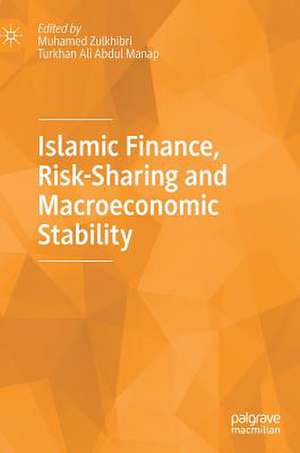Islamic Finance, Risk-Sharing and Macroeconomic Stability
Editat de Muhamed Zulkhibri, Turkhan Ali Abdul Manapen Limba Engleză Hardback – 5 mar 2019
Preț: 1005.74 lei
Preț vechi: 1226.52 lei
-18% Nou
Puncte Express: 1509
Preț estimativ în valută:
192.45€ • 201.44$ • 160.18£
192.45€ • 201.44$ • 160.18£
Carte tipărită la comandă
Livrare economică 31 martie-14 aprilie
Preluare comenzi: 021 569.72.76
Specificații
ISBN-13: 9783030052249
ISBN-10: 3030052249
Pagini: 246
Ilustrații: XVI, 268 p. 12 illus., 10 illus. in color.
Dimensiuni: 148 x 210 mm
Greutate: 0.61 kg
Ediția:1st ed. 2019
Editura: Springer International Publishing
Colecția Palgrave Macmillan
Locul publicării:Cham, Switzerland
ISBN-10: 3030052249
Pagini: 246
Ilustrații: XVI, 268 p. 12 illus., 10 illus. in color.
Dimensiuni: 148 x 210 mm
Greutate: 0.61 kg
Ediția:1st ed. 2019
Editura: Springer International Publishing
Colecția Palgrave Macmillan
Locul publicării:Cham, Switzerland
Cuprins
1. Introduction; Muhamed Zulkhibri and Turkhan Ali Abdul Manap.- Part I. The Nature of Islamic Economics and Macroeconomic Stability.- 2. Islamic Economics: “New Paradigm” or “Old Capitalism”?; Necati Aydin.- 3. The Theological Foundations of Islamic Banking: A Critical Review; Md. Thowhidul Islam.- Part II. Risk Sharing, Islamic Bank Capital and Financial Regulation.- 4. Capital Structure and Shari’ah Compliance Firms: Malaysian Evidence; Asyraf Abdul Halim, Mohd Edil Abd Sukor, Obiyathulla Ismath Bacha.- 5. Capital Regulatory Requirements for Islamic Banks in UAE: A Comparative Analysis; Abdussalam Ismail Onagun.- 6. Monetary Management in a Dual Banking System: A Nominal GDP Targeting Approach; Mehdi Hadian.- Part III. Financial Leverage and Risk-Sharing in Islamic Banking.- 7. Determinants of Financial Leverage in Islamic Banks; M.A. Rehman Shah, A. Rashid, M. Khaleequzzaman.- 8. Measuring Systemic Risk in Dual Banking System: The Case of Malaysia; Turkhan Ali Abdul Manap.- 9. Credit Risk, Bank Performance and Islamic Banking: Evidence from Pakistan; Azam Ali, Muhamed Zulkhibri, Tanveer Kishwar,.- Part IV. Islamic Finance for Socioeconomic Development.- 10. Resource Mobilisation and Islamic Charity-Giving in Indonesia: Evidence from Low-Income Households; Laily Dwi Arsyianti, Salina Kassim, Adewale Abideen Adeyemi.- 11. Islamic Finance and Financial Exclusion in Minority Muslin Countries: The Case of India; Ummer Farooque Musliyar Kurunkatil.- 12. Fintech and Risk-Sharing: A Catalyst for Islamic Finance; Siti Muawanah Lajis.
Notă biografică
Muhamed Zulkhibri is a Senior Economist at Islamic Research and Training Institute (IRTI), Islamic Development Bank (IDB), Kingdom of Saudi Arabia, with years of experience in the Central Bank of Malaysia and policy-oriented institutions. He has written extensively on monetary economics, financial institutions and markets, finance and economic development as well as Islamic economics and finance. He has published in leading academic journals, industry reports, and the financial press. He has also lectured for under- and post-graduate programs at the University of Nottingham, UK and University Putra, Malaysia. He earned a PhD in economics from University of Nottingham, UK.
Turkhan Ali Abdul Manap is a Senior Research Economist at Islamic Research and Training Institute (IRTI), Islamic Development Bank (IDB), Kingdom of Saudi Arabia. Prior to joining IRTI, he was an Associate Professor of Economics in the Faculty of Economics and Management Sciences, International Islamic University Malaysia (IIUM), where he taught various courses for Bachelor, Master and PhD levels. His research interests include macroeconomics, (Islamic) capital markets, financial stability, and stress testing for Islamic financial institutions. He has spoken and attended various national and international conferences on economics and finance issues and his research papers have appeared in numerous academic journals. He obtained his PhD in economics from IIUM, Malaysia.
Textul de pe ultima copertă
The concept of risk-sharing in financial and social contracts is one of the unique features of Islamic finance. Many theoretical studies generally claim superiority of an Islamic financial system based on pure equity and participatory modes of financing, while empirical studies provide mixed results. Studies and discussions are needed to fully understand how Islamic finance could contribute to the ongoing discussion of financial stability. Against this background, this book addresses various aspects of Islamic finance and the risk-sharing mechanism contributions to the overall macroeconomic and financial stability. Undoubtedly, the findings and recommendation from this book should be of great interest not only to future academic researchers in the field of macroeconomic stability and Islamic finance, but also to policy makers and regulators who are keen on drawing lessons from Islamic finance experiences to prevent similar crisis in the future.
Caracteristici
Examines the compatibility of capitalism and Islamic economics/finance by addressing important questions Proposes nominal-GDP targeting (NGDPT) framework as an efficient monetary policy that is also consistent with Islamic monetary economy Provides the Shari’ah as the principal source of Islamic banking Investigates the effects of dynamic forces behind capital structure variation such as the optimal capital structure behaviour based on the trade-off, pecking order, market timing and firm fixed effect models of capital structure
